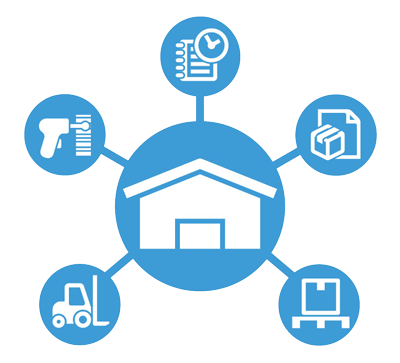Erp and Wms
Efficient and effective enterprise applications services in areas such as Enterprise Resource Planning (ERP), Customer Relationship Management (CRM) are essential to ensure competitiveness and smooth operations.
ERP System is business-management software typically a suite of integrated applications that an organization can use to collect, store, manage and interpret data from many business activities, including :
Enterprise Resource Planning (ERP)
ERP provides an integrated view of core business processes, often in real-time, using common databases maintained by a database management system. ERP systems track business resources cash, raw materials, production capacity and the status of business commitments: orders, purchase orders, and payroll.
The applications that make up the system share data across various departments (manufacturing, purchasing, sales, accounting, etc.) that provide the data. ERP facilitates information flow between all business functions, and manages connections to outside stakeholders.

Benefits of ERP
Scalability : An ERP system is easily scalable. That means adding new functionality to the system as the business needs change is easy. This could mean easy management of new processes, departments, and more.
Improved Reporting : Much of the inefficiency in operational work stems from improper reporting. With an ERP system, this possibility is eliminated as reporting follows an automated template system, allowing various departments to access information seamlessly.
Data Quality : As compared with manual record-keeping or other traditional approaches, an ERP system improves data quality by improving the underlying processes. As a result, better business decisions can be reached.
Lower Cost Of Operations : An ERP system introduces fundamental innovations in managing resources, which eliminates delays and thus reduces cost of operations. For instance, use of mobility allows real-time collection of data, which is indispensable to lowering costs.
Better CRM : A direct benefit of using a good ERP system is improved customer relations as a result of better business processes.

Warehouse Management System (WMS)
A warehouse management system (WMS) is a software application, designed to support warehouse or distribution center management and staff. They facilitate management in their daily planning, organizing, staffing, directing, and controlling the utilization of available resources, to move and store materials into, within, and out of a warehouse, while supporting staff in the performance of material movement and storage in and around a warehouse.
A WMS system tracks the movement of each inventory item and provides intelligence on optimizing inventory based on real-time information. An advanced WMS system analyzes the data of the product, status, lot, dates, dimensions, location, area, region, owner and inventory details. And then it determines which would be the best location to store the recently received product. Some older ERP packages do not provide this functions.
